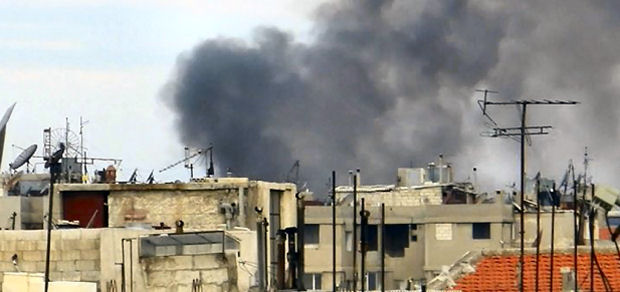United Nations fiddles while Syria burns
Defence analyst Anthony Tucker-Jones argues that Russia’s refusal to recognise the inevitable in Syria is condemning the country to an agonising death.

This week the UN was finally goaded into action over the chaos in Syria. However, once again its efforts to act decisively were blocked by Moscow’s continued feet-dragging.
A leaked draft UN resolution called for President al-Assad‘s government to be out within 15 days, but Moscow will never countenance such a demand and threatened to veto this in the security council.
The Arab League’s mission to restore order lies in tatters.
Russia and China are resolutely opposed to the international community fostering regime change in Syria.
Although the draft avoided any explicit call for military action against al-Assad, Moscow will not even support a proposal to “stem” the flow of arms – even though an outright ban was not on the table.
The UN was forced back to the drawing board. To avoid a Russian veto or even an abstention, Moscow got its own way, with the revised text dropping calls for al-Assad to step down and any suggestion of an arms embargo.
Too much to bear
Essentially it’s too much for Moscow to bear. Ever since the demise of the Soviet Union, its former allies and client states have slowly but surely drifted from the fold.
It is a process that started with Egypt, followed by Iraq and Libya. Now Syria stands on the cusp.
Billions of dollars of Libyan weapons contracts with Moscow face an uncertain future following the demise of Gaddafi. Russia certainly does not want to abandon the $1.5bn worth of weapons al-Assad signed up to.
To that end Russian weapon shipments have continued to be delivered to the Syrian port of Tartus on the pretext they are existing contracts.
Read more: What does the UN's Syria resolution tell us?
‘Security solution’
The Arab League’s mission to restore order lies in tatters. All it did was enflame the opposition. Now the violence is worse and the activities of the Free Syrian Army have led to another knee-jerk reaction from the military.
President al-Assad and Walid al-Moallem, his foreign minister, have firmly nailed their colours to the mast by declaring they are seeking a “security solution” to the crisis.
Clearly, in the face of Arab League impotence, the gloves are off. Damascus is determined to retake those towns under opposition control. With the FSA five miles from the presidential palace, it has little choice.
With open warfare on the streets, wrangling within the UN Security Council means any attempts to stop the spiralling civil war will be too little too late.
Sectarian violence rife
In Damascus the military is attempting to wrestle back control of the suburbs of Ein Tarma, Kfar Batna, Hammouriya and Saqba, as well as the outlying town of Douma. In addition, they set about Rankous 20 miles north of the capital.
Renewed attacks have also been launched against the cities of Hama and Homs. Reports indicate that Mesraba, Harsata, Irben and Zabadani are surrounded. In the latter the military negotiated an unheard of truce with the FSA. This is a significant step by anyone’s reckoning.
History has a nasty habit of repeating itself and, unlike Libya, Syria is no exception to the rule.
Sectarian violence is now rife as al-Assad’s Alawite Shia minority launch revenge attacks on Sunni communities. This was graphically illustrated by the massacre of 14 members of the Bahader family in Homs.
Gennady Gatilov, the Russian deputy foreign minister, has warned that adoption of a UN resolution will lead to civil war. Some might reasonably argue that this is already happening.
The success of any forthcoming vote by the UN Security Council now hangs on Moscow dropping its unreasonable demand that the UN ban any future foreign intervention in Syria.
The Muslim world never forgave the UN for allowing Bosnia to fall into bloody civil war. Yet history always has a nasty habit of repeating itself and, unlike Libya, Syria is no exception to the rule.
Anthony Tucker-Jones is a freelance defence writer and an expert on regional conflicts. He is also the terrorism and security correspondent for Intersec – The Journal of International Security
